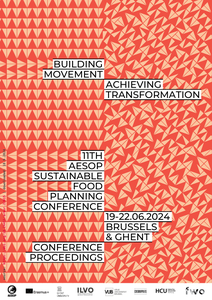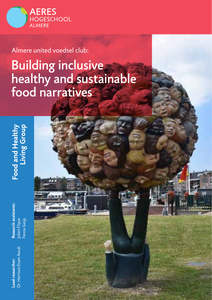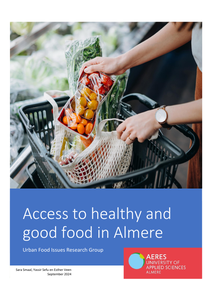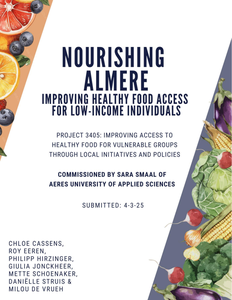Citizens living in food poverty can easily get caught up in a vicious cycle. Socio-economically disadvantaged people often rely on food assistance and are more likely to suffer from diseases caused by unhealthy diets, such as diabetes. They may also experience isolation and lack social networks, as they do not have the financial means to participate in social life. Moreover, this group is often overlooked in decision-making processes regarding healthy and sustainable food environments. To create equitable food environments in urban areas, it is crucial to incorporate the everyday challenges and needs of socioeconomically disadvantaged people. In our collaborative research, we explore the needs of socioeconomically disadvantaged people regarding a healthy and sustainable diet in Switzerland and the Netherlands. The aim is also to develop, in a participatory way, ideas on how to create more socially just and inclusive food environments.Keywords: food poverty, food environments, social participation, participatory action research
DOCUMENT

The transition towards a sustainable and healthy food system is one of the major sustainability challenges of today, next to the energy transition and the transition from a linear to circular economy. This paper provides a timely and evidence-based contribution to better understand the complex processes of institutional change and transformative social-ecological innovation that takes place in the food transition, through a case study of an open innovation and food transition network in The Netherlands, the South-Holland Food Family (Zuid-Hollandse Voedselfamilie). This network is supported by the provincial government and many partners, with the ambition to realize more sustainable agricultural and food chains, offering healthy, sustainable and affordable food for everyone in the Province of South-Holland in five to ten years from now. This ambition cannot be achieved through optimising the current food system. A transition is needed – a fundamental change of the food system’s structure, culture and practice. The Province has adopted a transition approach in its 2016 Innovation Agenda for Sustainable Agriculture. This paper provides an institutional analysis of how the transition approach has been established and developed in practice. Our main research question is what interventions and actions have shaped the transition approach and how does the dynamic interplay between actors and institutional structures influence institutional change, by analysing a series of closely related action situations and their context, looking at 'structure' and 'agency', and at the output-outcomes-impact of these action situations. For this purpose, we use the Transformative Social-Ecological Innovation (TSEI)-framework to study the dynamic interplay between actors and institutional structures influencing institutional change. The example of TSEI-framework application in this paper shows when and how local agents change the institutional context itself, which provides relevant insights on institutional work and the mutually constitutive nature of structure and agency. Above institutional analysis also shows the pivotal role of a number of actors, such as network facilitators and provincial minister, and their capability and skills to combine formal and informal institutional environments and logics and mobilize resources, thereby legitimizing and supporting the change effort. The results are indicative of the importance of institutional structures as both facilitating (i.e., the province’s policies) and limiting (e.g. land ownership) transition dynamics.
DOCUMENT

The aim was to study the needs, opportunities and effects of citizen engagement in the urban food system transition. This addresses the issue of - ‘how’, ‘in what ways’ and ‘through what methods’ - citizens can be engaged in the developments towards a more sustainable and healthy regional food system. The research project sought to investigate the roles citizen engagement can take in the transformation of the urban food environment towards healthier and sustainable food consumption patterns. The study covers desired food futures; food discourse; the message our bodies convey about our eating habits; the effect of Covid-19 on food pattern transformations; the term 'organic' in relation to food; mass media as a source of information about food.
DOCUMENT

This report delves into food insecurity in Almere, focusing on how residents with limited financial means access and consume (healthy) food. The study employed an action research approach, engaging directly with affected individuals and stakeholders to understand their challenges and co-develop solutions. The primary aim was to empower participants by amplifying their voices and providing actionable insights into addressing food insecurity in the community. To achieve this aim we conducted workshops, in-depth interviews and a study using WhatsApp.
DOCUMENT

This report, commissioned by Aeres University of Applied Sciences Almere, outlines how local food initiatives and other community support systems can help to enhance access to healthy food for socio-economically vulnerable groups in Almere. Through literature research, interviews with stakeholders, and a survey among the target group, the main accessibility barriers in accessing healthy food were identified. The results show that the availability of healthy food for socio-economically disadvantaged groups is not just influenced by financial constraints, but also by spatial, social, and knowledge aspects. The report provides concrete recommendations for meaningful change, such as better collaboration between actors, awareness raising, and spatial interventions in the food environment. These results can be used by policymakers, local initiatives, and other stakeholders do develop a more sustainable and equitable food strategy for Almere, where healthy food is accessible to everyone.Keywords: healthy food; Socio-economically vulnerable groups; Accessibility barriers; Recommendations for meaningful change; Food environment theory
DOCUMENT

The study hereby presented is part of a major program led by the Wageningen University and Research Centre (WURC), to which alongside the authors’ institutions also the Louis Bolk Institute (LBI) contributed. The overarching aim of the program is to support healthy and sustainable food choices among both employees and customers in health care and hospitality settings. The present study’s aim is to evaluate employees’ awareness of the healthiness of their food choice both at home and out of home, and the reasons behind these choices.
DOCUMENT
More and more people worldwide live in urban areas, and these areas face many problems, of which a sustainable food provision is one. In this paper we aim to show that a transition towards more sustainable, regionally organized food systems strongly contributes to green, livable cities. The article describes a case study in the Dutch region of Arnhem–Nijmegen. Partners of a network on sustainable food in this region were interviewed on how they expect the food system to develop, and in design studies possible futures are explored. Both the interviews and the designs give support to the idea that indeed sustainable food systems can be developed to contribute to green livable cities. They show that the quality and meaning of existing green areas can be raised; new areas can be added to a public green system, and connections with green surroundings are enforced. They also show that inhabitants or consumers can be stimulated to become so called food citizens, highlighting that the relation of food systems and livable cities is a very close one.
DOCUMENT

Food security depends on a network of actors and elements working together to produce and deliver healthy, sustainable, varied, safe and plentiful food supply to society. The interactions between these actors and elements must be designed, managed and optimized to satisfy demand. In this chapter we introduce Food Supply Chain Optimization and Demand, providing a framework to understand and improve food security from an operational and strategic point of view.
DOCUMENT
The design of health game rewards for preadolescents Videogames are a promising strategy for child health interventions, but their impact can vary depending on the game mechanics used. This study investigated achievement-based ‘rewards’ and their design among preadolescents (8-12 years) to assess their effect and explain how they work. In a 2 (game reward achievement system: social vs. personal) x 2 (game reward context: in-game vs. out-game) between-subjects design, 178 children were randomly assigned to one of four conditions. Findings indicated that a ‘personal’ achievement system (showing one’s own high scores) led to more attention and less frustration than a ‘social’ achievement system (showing also high scores of others) which, in turn, increased children’s motivation to make healthy food choices. Furthermore, ‘out’-game rewards (tangible stickers allocated outside the game environment) were liked more than ‘in’-game rewards (virtual stickers allocated in the game environment), leading to greater satisfaction and, in turn, a higher motivation to make healthy food choices.
LINK
Jaarboek van de afstudeerders van HAS hogeschool, opleiding Food design 2016 met hun concepten ingedeeld in schakels van de keten: - In het deel Agri & Ingredients zijn ingrediënten en agrarische producten zoals groenten, peulvruchten als startpunt genomen van innovatie. - In het deel Factory treft u technologische innovaties en ontwikkelingen gericht op product, proces en kwaliteitsborging. - In het deel Channel kunt u innovaties in het marktkanaal, zoals blurring, omnichannel en online fooddiensten verwachten. - In het hoofdstuk Consumer zijn concepten te vinden die gericht zijn op specifieke doelgroepen, zoals ouderen, mensen met anosmie en stoeremannen.
DOCUMENT
